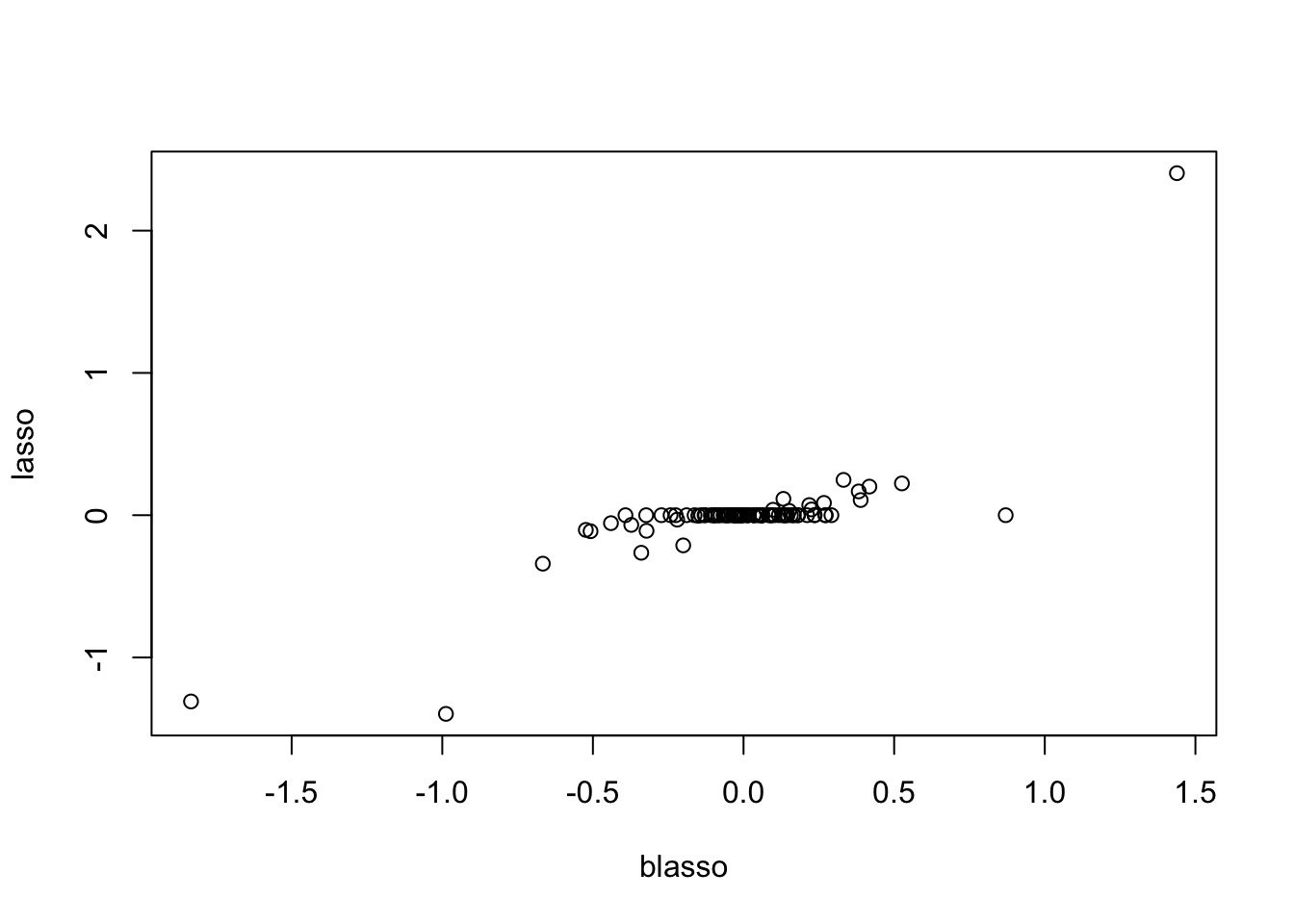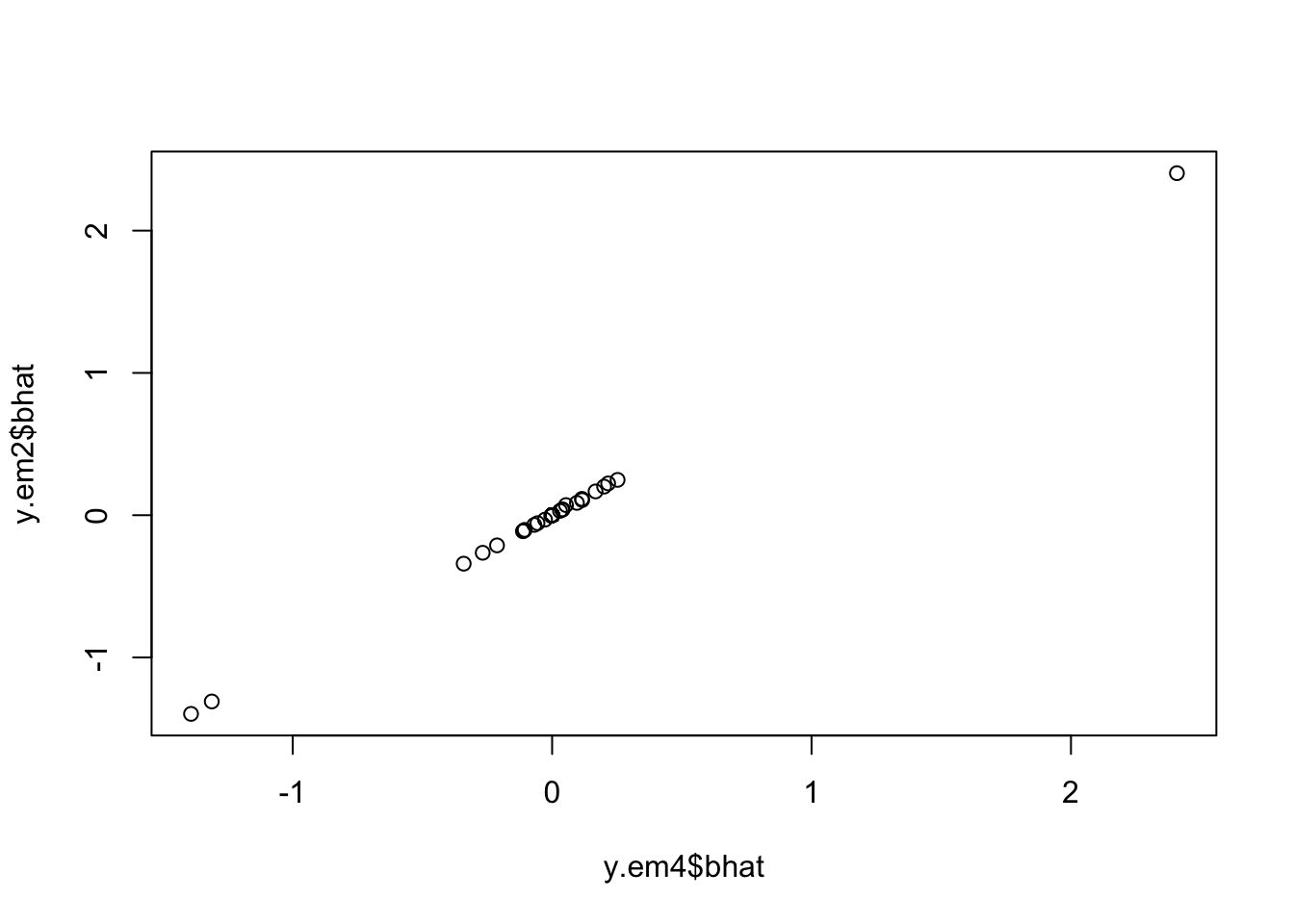fit Lasso by EM
Matthew Stephens
2020-06-02
Last updated: 2020-06-17
Checks: 7 0
Knit directory: misc/analysis/
This reproducible R Markdown analysis was created with workflowr (version 1.6.1). The Checks tab describes the reproducibility checks that were applied when the results were created. The Past versions tab lists the development history.
Great! Since the R Markdown file has been committed to the Git repository, you know the exact version of the code that produced these results.
Great job! The global environment was empty. Objects defined in the global environment can affect the analysis in your R Markdown file in unknown ways. For reproduciblity it’s best to always run the code in an empty environment.
The command set.seed(1) was run prior to running the code in the R Markdown file. Setting a seed ensures that any results that rely on randomness, e.g. subsampling or permutations, are reproducible.
Great job! Recording the operating system, R version, and package versions is critical for reproducibility.
Nice! There were no cached chunks for this analysis, so you can be confident that you successfully produced the results during this run.
Great job! Using relative paths to the files within your workflowr project makes it easier to run your code on other machines.
Great! You are using Git for version control. Tracking code development and connecting the code version to the results is critical for reproducibility.
The results in this page were generated with repository version 430bbbb. See the Past versions tab to see a history of the changes made to the R Markdown and HTML files.
Note that you need to be careful to ensure that all relevant files for the analysis have been committed to Git prior to generating the results (you can use wflow_publish or wflow_git_commit). workflowr only checks the R Markdown file, but you know if there are other scripts or data files that it depends on. Below is the status of the Git repository when the results were generated:
Ignored files:
Ignored: .DS_Store
Ignored: .Rhistory
Ignored: .Rproj.user/
Ignored: analysis/.RData
Ignored: analysis/.Rhistory
Ignored: analysis/ALStruct_cache/
Ignored: data/.Rhistory
Ignored: data/pbmc/
Untracked files:
Untracked: .dropbox
Untracked: Icon
Untracked: analysis/GHstan.Rmd
Untracked: analysis/GTEX-cogaps.Rmd
Untracked: analysis/PACS.Rmd
Untracked: analysis/Rplot.png
Untracked: analysis/SPCAvRP.rmd
Untracked: analysis/admm_02.Rmd
Untracked: analysis/admm_03.Rmd
Untracked: analysis/compare-transformed-models.Rmd
Untracked: analysis/cormotif.Rmd
Untracked: analysis/cp_ash.Rmd
Untracked: analysis/eQTL.perm.rand.pdf
Untracked: analysis/eb_prepilot.Rmd
Untracked: analysis/eb_var.Rmd
Untracked: analysis/ebpmf1.Rmd
Untracked: analysis/flash_test_tree.Rmd
Untracked: analysis/ieQTL.perm.rand.pdf
Untracked: analysis/m6amash.Rmd
Untracked: analysis/mash_bhat_z.Rmd
Untracked: analysis/mash_ieqtl_permutations.Rmd
Untracked: analysis/mixsqp.Rmd
Untracked: analysis/mr.mash.test.Rmd
Untracked: analysis/mr_ash_modular.Rmd
Untracked: analysis/mr_ash_parameterization.Rmd
Untracked: analysis/mr_ash_pen.Rmd
Untracked: analysis/nejm.Rmd
Untracked: analysis/normalize.Rmd
Untracked: analysis/pbmc.Rmd
Untracked: analysis/poisson_transform.Rmd
Untracked: analysis/pseudodata.Rmd
Untracked: analysis/qrnotes.txt
Untracked: analysis/ridge_iterative_02.Rmd
Untracked: analysis/ridge_iterative_splitting.Rmd
Untracked: analysis/samps/
Untracked: analysis/sc_bimodal.Rmd
Untracked: analysis/shrinkage_comparisons_changepoints.Rmd
Untracked: analysis/susie_en.Rmd
Untracked: analysis/susie_z_investigate.Rmd
Untracked: analysis/svd-timing.Rmd
Untracked: analysis/temp.RDS
Untracked: analysis/temp.Rmd
Untracked: analysis/test-figure/
Untracked: analysis/test.Rmd
Untracked: analysis/test.Rpres
Untracked: analysis/test.md
Untracked: analysis/test_qr.R
Untracked: analysis/test_sparse.Rmd
Untracked: analysis/z.txt
Untracked: code/multivariate_testfuncs.R
Untracked: code/rqb.hacked.R
Untracked: data/4matthew/
Untracked: data/4matthew2/
Untracked: data/E-MTAB-2805.processed.1/
Untracked: data/ENSG00000156738.Sim_Y2.RDS
Untracked: data/GDS5363_full.soft.gz
Untracked: data/GSE41265_allGenesTPM.txt
Untracked: data/Muscle_Skeletal.ACTN3.pm1Mb.RDS
Untracked: data/Thyroid.FMO2.pm1Mb.RDS
Untracked: data/bmass.HaemgenRBC2016.MAF01.Vs2.MergedDataSources.200kRanSubset.ChrBPMAFMarkerZScores.vs1.txt.gz
Untracked: data/bmass.HaemgenRBC2016.Vs2.NewSNPs.ZScores.hclust.vs1.txt
Untracked: data/bmass.HaemgenRBC2016.Vs2.PreviousSNPs.ZScores.hclust.vs1.txt
Untracked: data/eb_prepilot/
Untracked: data/finemap_data/fmo2.sim/b.txt
Untracked: data/finemap_data/fmo2.sim/dap_out.txt
Untracked: data/finemap_data/fmo2.sim/dap_out2.txt
Untracked: data/finemap_data/fmo2.sim/dap_out2_snp.txt
Untracked: data/finemap_data/fmo2.sim/dap_out_snp.txt
Untracked: data/finemap_data/fmo2.sim/data
Untracked: data/finemap_data/fmo2.sim/fmo2.sim.config
Untracked: data/finemap_data/fmo2.sim/fmo2.sim.k
Untracked: data/finemap_data/fmo2.sim/fmo2.sim.k4.config
Untracked: data/finemap_data/fmo2.sim/fmo2.sim.k4.snp
Untracked: data/finemap_data/fmo2.sim/fmo2.sim.ld
Untracked: data/finemap_data/fmo2.sim/fmo2.sim.snp
Untracked: data/finemap_data/fmo2.sim/fmo2.sim.z
Untracked: data/finemap_data/fmo2.sim/pos.txt
Untracked: data/logm.csv
Untracked: data/m.cd.RDS
Untracked: data/m.cdu.old.RDS
Untracked: data/m.new.cd.RDS
Untracked: data/m.old.cd.RDS
Untracked: data/mainbib.bib.old
Untracked: data/mat.csv
Untracked: data/mat.txt
Untracked: data/mat_new.csv
Untracked: data/matrix_lik.rds
Untracked: data/paintor_data/
Untracked: data/temp.txt
Untracked: data/y.txt
Untracked: data/y_f.txt
Untracked: data/zscore_jointLCLs_m6AQTLs_susie_eQTLpruned.rds
Untracked: data/zscore_jointLCLs_random.rds
Untracked: explore_udi.R
Untracked: output/fit.k10.rds
Untracked: output/fit.varbvs.RDS
Untracked: output/glmnet.fit.RDS
Untracked: output/test.bv.txt
Untracked: output/test.gamma.txt
Untracked: output/test.hyp.txt
Untracked: output/test.log.txt
Untracked: output/test.param.txt
Untracked: output/test2.bv.txt
Untracked: output/test2.gamma.txt
Untracked: output/test2.hyp.txt
Untracked: output/test2.log.txt
Untracked: output/test2.param.txt
Untracked: output/test3.bv.txt
Untracked: output/test3.gamma.txt
Untracked: output/test3.hyp.txt
Untracked: output/test3.log.txt
Untracked: output/test3.param.txt
Untracked: output/test4.bv.txt
Untracked: output/test4.gamma.txt
Untracked: output/test4.hyp.txt
Untracked: output/test4.log.txt
Untracked: output/test4.param.txt
Untracked: output/test5.bv.txt
Untracked: output/test5.gamma.txt
Untracked: output/test5.hyp.txt
Untracked: output/test5.log.txt
Untracked: output/test5.param.txt
Unstaged changes:
Modified: analysis/ash_delta_operator.Rmd
Modified: analysis/ash_pois_bcell.Rmd
Modified: analysis/minque.Rmd
Modified: analysis/mr_missing_data.Rmd
Note that any generated files, e.g. HTML, png, CSS, etc., are not included in this status report because it is ok for generated content to have uncommitted changes.
These are the previous versions of the repository in which changes were made to the R Markdown (analysis/lasso_em.Rmd) and HTML (docs/lasso_em.html) files. If you’ve configured a remote Git repository (see ?wflow_git_remote), click on the hyperlinks in the table below to view the files as they were in that past version.
| File | Version | Author | Date | Message |
|---|---|---|---|---|
| Rmd | 430bbbb | Matthew Stephens | 2020-06-17 | workflowr::wflow_publish(“analysis/lasso_em.Rmd”) |
| html | 99039f1 | Matthew Stephens | 2020-06-02 | Build site. |
| Rmd | 7e5fa41 | Matthew Stephens | 2020-06-02 | workflowr::wflow_publish(“lasso_em.Rmd”) |
Introduction
The idea here is to implement an EM algorithm for the Lasso. My implementation is based on these lecture notes from M Figuerdo.
I also have relevant handwritten notes with some derivations here.
# see objective computation for scaling of eta and residual variance s2
lasso_em = function(y,X,b.init,s2=1,eta=1,niter=100){
n = nrow(X)
p = ncol(X)
b = b.init # initiolize
XtX = t(X) %*% X
Xty = t(X) %*% y
obj = rep(0,niter)
for(i in 1:niter){
W = diag(as.vector((1/abs(b)) * sqrt(2/eta)))
V = chol2inv(chol(s2*W + XtX))
b = V %*% Xty
# the computation here was intended to avoid
# infinities in the weights by working with Winv
# could improve this...
# Winv_sqrt = diag(as.vector(sqrt(abs(b) * sqrt(eta/2))))
# V = chol2inv(chol(diag(s2,p) + Winv_sqrt %*% XtX %*% Winv_sqrt))
# b = Winv_sqrt %*% V %*% Winv_sqrt %*% Xty
r = (y - X %*% b)
obj[i] = (1/(2*s2)) * (sum(r^2)) + sqrt(2/eta)*(sum(abs(b)))
}
return(list(bhat=b, obj=obj))
}Here I try it out on a trend filtering example. I run twice from two different random initializations
set.seed(100)
sd = 1
n = 100
p = n
X = matrix(0,nrow=n,ncol=n)
for(i in 1:n){
X[i:n,i] = 1:(n-i+1)
}
#X = X %*% diag(1/sqrt(colSums(X^2)))
btrue = rep(0,n)
btrue[40] = 8
btrue[41] = -8
y = X %*% btrue + sd*rnorm(n)
plot(y)
lines(X %*% btrue)
y.em1 = lasso_em(y,X,b.init = rnorm(100),1,1,100)
lines(X %*% y.em1$bhat,col=2)
y.em2 = lasso_em(y,X,b.init = rnorm(100),1,1,100)
lines(X %*% y.em2$bhat,col=3)
| Version | Author | Date |
|---|---|---|
| 99039f1 | Matthew Stephens | 2020-06-02 |
And check the objective is decreasing:
plot(y.em1$obj,type="l")
lines(y.em2$obj,col=2)
| Version | Author | Date |
|---|---|---|
| 99039f1 | Matthew Stephens | 2020-06-02 |
Bayesian Lasso
We should be able to do the same thing to fit the ``variational bayesian lasso“, by which here I mean compute the (approximate) posterior mean under the double-exponential prior.
# see objective computation for scaling of eta and residual variance s2
# if compute_mode=TRUE we have the regular LASSO
blasso_em = function(y,X,b.init,s2=1,eta=1,niter=100,compute_mode=FALSE){
n = nrow(X)
p = ncol(X)
b = b.init # initiolize
XtX = t(X) %*% X
Xty = t(X) %*% y
obj = rep(0,niter)
EB = rep(1,p)
varB = rep(1,p)
for(i in 1:niter){
W = as.vector(1/sqrt(varB + EB^2) * sqrt(2/eta))
V = chol2inv(chol(XtX+ diag(s2*W)))
Sigma1 = s2*V # posterior variance of b
varB = diag(Sigma1)
if(compute_mode){
varB = rep(0,p)
}
mu1 = as.vector(V %*% Xty) # posterior mean of b
EB = mu1
}
return(list(bhat=EB))
}y.em3 = blasso_em(y,X,b.init = rnorm(100),1,1,100)
plot(y,main="red=blasso; green = lasso")
lines(X %*% y.em3$bhat,col=2)
lines(X %*% y.em2$bhat,col=3)
| Version | Author | Date |
|---|---|---|
| 99039f1 | Matthew Stephens | 2020-06-02 |
plot(y.em3$bhat,y.em2$bhat, xlab="blasso",ylab="lasso")
| Version | Author | Date |
|---|---|---|
| 99039f1 | Matthew Stephens | 2020-06-02 |
Check the posterior mode is same as my Lasso implementation
y.em4 = blasso_em(y,X,b.init = rnorm(100),1,1,100,compute_mode=TRUE)
plot(y)
lines(X %*% y.em4$bhat,col=2)
lines(X %*% y.em2$bhat,col=3)
| Version | Author | Date |
|---|---|---|
| 99039f1 | Matthew Stephens | 2020-06-02 |
plot(y.em4$bhat,y.em2$bhat)
| Version | Author | Date |
|---|---|---|
| 99039f1 | Matthew Stephens | 2020-06-02 |
Update eta
A next step would be to update eta (and the residual variance). This becomes a “Variational Empirical Bayes” (VEB) approach.
The update for eta is rather simple: eta = mean(sqrt(diag(EB2))*sqrt(eta/2) + eta/2). Again see here.
The update for \(s^2\) is \[(1/n)E||y-Xb||^2_2\]. This could be simplified if we make a mean-field approximation, but for now we just go with the full
calc_s2hat = function(y,X,XtX,EB,EB2){
n = length(y)
Xb = X %*% EB
s2hat = as.numeric((1/n)* (t(y) %*% y - 2*sum(y*Xb) + sum(XtX * EB2)))
}
# see objective computation for scaling of eta and residual variance s2
# if compute_mode=TRUE we have the regular LASSO
blasso_veb = function(y,X,b.init,s2=1,eta=1,niter=100){
n = nrow(X)
p = ncol(X)
b = b.init # initiolize
XtX = t(X) %*% X
Xty = t(X) %*% y
obj = rep(0,niter)
EB = rep(1,p)
EB2 = diag(p)
for(i in 1:niter){
W = as.vector(1/sqrt(diag(EB2) + EB^2) * sqrt(2/eta))
V = chol2inv(chol(XtX+ diag(s2*W)))
Sigma1 = s2*V # posterior variance of b
varB = diag(Sigma1)
mu1 = as.vector(V %*% Xty) # posterior mean of b
EB = mu1
EB2 = Sigma1 + outer(mu1,mu1)
eta = mean(sqrt(diag(EB2))*sqrt(eta/2) + eta/2)
s2 = calc_s2hat(y,X,XtX,EB,EB2)
}
return(list(bhat=EB,eta=eta,s2 = s2))
}set.seed(100)
sd = 1
n = 100
p = n
X = matrix(0,nrow=n,ncol=n)
for(i in 1:n){
X[i:n,i] = 1:(n-i+1)
}
#X = X %*% diag(1/sqrt(colSums(X^2)))
btrue = rep(0,n)
btrue[40] = 8
btrue[41] = -8
y = X %*% btrue + sd*rnorm(n)
plot(y)
lines(X %*% btrue)
y.veb = blasso_veb(y,X,b.init = rnorm(100),1,1,100)
lines(X %*% y.veb$bhat,col=2)
sessionInfo()R version 3.6.0 (2019-04-26)
Platform: x86_64-apple-darwin15.6.0 (64-bit)
Running under: macOS Mojave 10.14.6
Matrix products: default
BLAS: /Library/Frameworks/R.framework/Versions/3.6/Resources/lib/libRblas.0.dylib
LAPACK: /Library/Frameworks/R.framework/Versions/3.6/Resources/lib/libRlapack.dylib
locale:
[1] en_US.UTF-8/en_US.UTF-8/en_US.UTF-8/C/en_US.UTF-8/en_US.UTF-8
attached base packages:
[1] stats graphics grDevices utils datasets methods base
loaded via a namespace (and not attached):
[1] workflowr_1.6.1 Rcpp_1.0.4.6 rprojroot_1.3-2 digest_0.6.25
[5] later_1.0.0 R6_2.4.1 backports_1.1.5 git2r_0.26.1
[9] magrittr_1.5 evaluate_0.14 stringi_1.4.6 rlang_0.4.5
[13] fs_1.3.2 promises_1.1.0 whisker_0.4 rmarkdown_2.1
[17] tools_3.6.0 stringr_1.4.0 glue_1.4.0 httpuv_1.5.2
[21] xfun_0.12 yaml_2.2.1 compiler_3.6.0 htmltools_0.4.0
[25] knitr_1.28